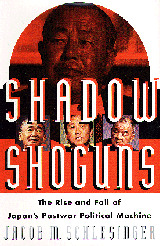GOLDSEA | ASIAN BOOKVIEW | NONFICTION
Shadow ShogunsJacob M. Schlesinger
Simon & Schuster, New York, 1997, 366pp, $26.00
Rise and Fall of the Postwar Japanese Political Machine
EXCERPT:
 hen the Japanese empire finally disintegrated in August 1945, Kakuei Tanaka was in an awkward spot.
hen the Japanese empire finally disintegrated in August 1945, Kakuei Tanaka was in an awkward spot.
He was a twenty-seven-year-old businessman in the colony of Korea, overseeing construction of an aircraft parts factory for the now-defeated imperial forces. There were more than 6 million Japanese--nearly half, like him, civilians--spread across Asia, dispatched over three decades to build and defend what had become the "Greater East Asian Co-prosperity Sphere." Overnight, the masters were stripped of their authority, and they found themselves trapped among their liberated--and hostile--subjects. The new mission of these humiliated colonialists was, somehow, to find a way home.
Many were subjected to rape, torture, hard labor, starvation, disease, public humiliation--traumas the Japanese themselves had inflicted when they were in charge. The escape from Korea would take more than a year for thousands of the fleeing empire builders, and many had to do it by foot through dangerous mountain terrain, camping outside in the rain and snow. Survivors would later describe it was a living hell.
Tanaka somehow was able to orchestrate a smoother retreat. He and a half-dozen fellow Japanese executives managed to get on a train to Pusan just three days after the official August 15 Japanese surrender and were given the royal treatment for a night at the Japanese Army's officers' quarters. Most of their compatriots lucky enough to reach Pusan so quickly were then kept languishing in crowded, disease-infested camps for weeks. Tanaka caught defense ship No. 34, a naval ferry to the northern tip of Japan's main island, on August 20. The craft was filled with women and children; in later years he would impishly credit a clerical error: he was listed on the ship's roster as Kikue, a woman's name, not his own unmistakeably masculine Kakuei. Others suspect he bribed his way aboard.

Tanaka is a significant figure in Japanese culture not just because of his achievements but because of his roots.
Prewar Japan was a nation governed by a well-bred, well-heeled elite, a country of haves and have-nots. The pressure and tensions resulting from his disparity were major causes, historians believe, of Japan's ruinous military crusade. "Postwar Japan", in contrast, was supposed to be different, a land of equality and opportunity. Tanaka's humble origins seemed to affirm the broader transformation; tales of his youth are staples of Japanese political lore, his country's equivalent of the Lincoln log-cabin legend.
ASIAN AIR ISSUES FORUM |
CONTACT US
© 1999-2003 GoldSea
No part of the contents of this site may be reproduced without prior written permission.
